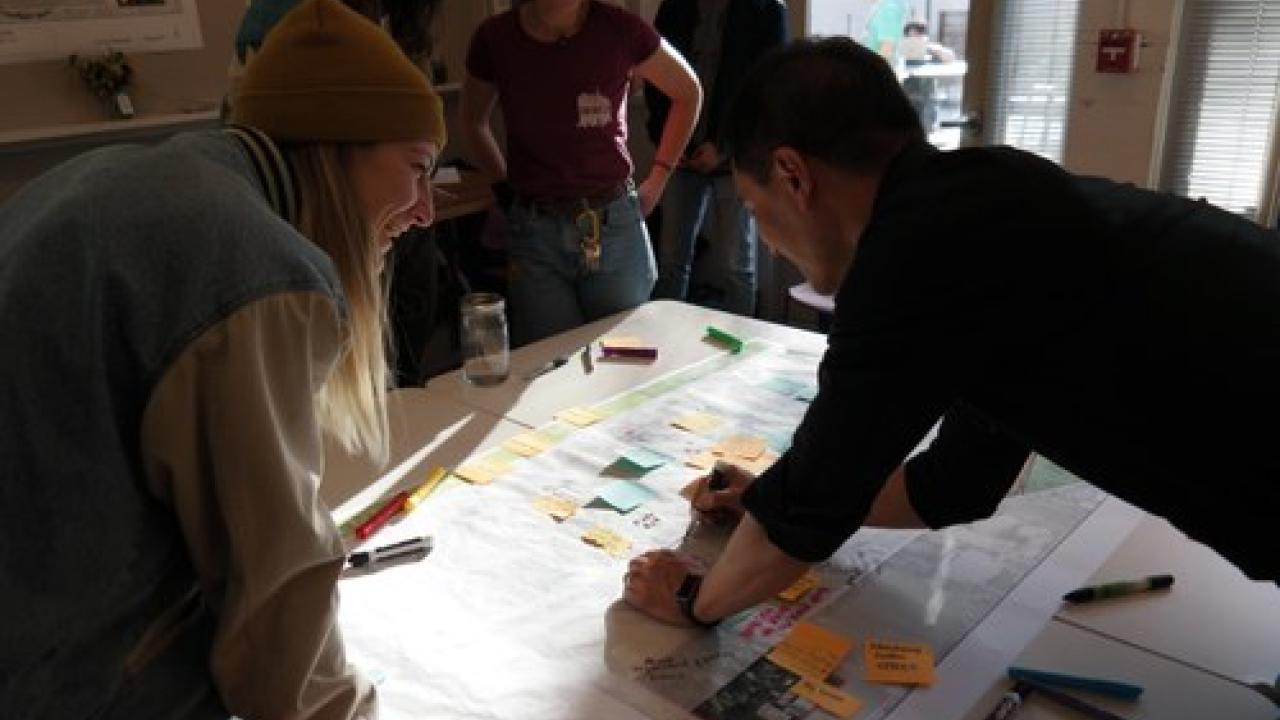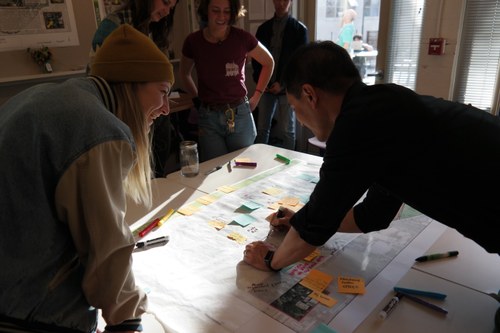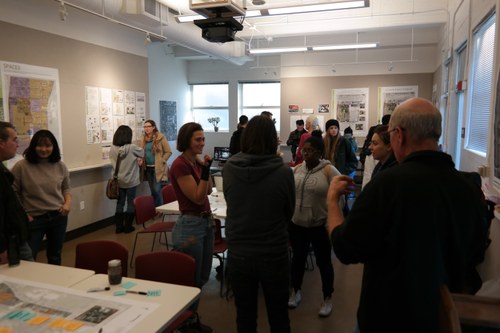
Students are Leading the Master Vision Plan for ASI’s Sustainable Living and Learning Communities
The western region of the UC Davis campus is home to the Student Farm, cooperative student housing, a community garden, and more. Students, staff, and faculty are working together to envision how these spaces on campus can transform into a collaborative whole, providing students with a place to actively experiment with farming and the built environment to look for integrated solution to living sustainably with limited resources.
By Carol Hillhouse
As the associate director of the Student Farm, I’m excited to be working with students to develop a vision for the Sustainable Living and Learning Communities (SLLC) at UC Davis. I’ve been working in farming systems on the UC Davis campus for 30 years and the SLLC brings together aspects of all my time here—from research in plant physiology to organic farming practices, and my work today in education and ecological horticulture—better known as gardening.
In my experiences, I’ve observed and thought hard about learning in garden and farm spaces, particularly student-driven, experiential learning around concepts of sustainability. What makes this learning experience so compelling and powerful for students? How can more students benefit from the opportunity and the fruits of these creative and productive spaces?

I work with student interns in the Ecological Garden and all around the Student Farm who actively maintain this productive land and share knowledge with their peers and the public. I am caught up in their enthusiasm, process, ability, and passion. I know that we need to expand the experiential learning opportunities for students on this campus and that has led to my work with the student-faculty-staff team to develop a broad and expansive master plan for the Sustainable Living and Learning Communities (SLLC).
Building the SLLC
It is clear that humanity is facing challenges of climate change and limited resources that will impact today’s students throughout their adult lives. Increasingly, the students we work with want to dedicate themselves to meeting these challenges and creating a more sustainable future, for themselves and for the planet.
The Sustainable Living and Learning Communities currently encompasses the west campus region nestled up against Highway 113 that includes the Student Farm, and extends north through ASUCD community gardens and into the Domes residential area.
Since the late 1970’s, these have been spaces where UC Davis students have initiated projects to explore new ideas and expand their understanding of sustainability.
As UC Davis continues to grow, and as this west campus area is home to more residents, the SLLC will be maintained as one of the last campus spaces that remains relatively undeveloped. However, this does not mean the space cannot provide widespread utility and accessibility. SLLC stakeholders are intent on preserving this parcel of land so that it will function in the future as it does now: a green space, able to be enjoyed by people of all abilities, where individuals can exercise their creativity by collaborating on sustainable initiatives.

The vision for the SLLC of the future is a space where even more students will be able to actively experiment with farming as well as the built environment to look for integrated solutions to living sustainably with limited resources. You can read the full description of the SLLC, as created by students, staff, and faculty here.
At this time, and with support from a private foundation, we are in a 5-month planning effort where a student-driven, creative process, mentored by faculty and staff, is guiding the physical and programmatic development of this concept.
A group of seven talented undergraduate students who were awarded fellowships lead the visioning process, and a graduate student researcher supports their work. David de la Peña, Professor of Landscape Design and Architecture, guides the team and provides technical and academic expertise. He has been working closely with Lucas Griffith, the UC Davis campus planner, to develop ideas that are feasible and in line with long-term campus planning and the need for more residences in this area.
As an academic coordinator and as the associate director of the Student Farm, I am working to ensure that the SLLC vision we develop holds promise for tomorrow’s students. I am coordinating with leadership in the College of Agricultural and Environmental Science, ASI, campus planning, and other campus stakeholders to ensure that these efforts make sense across campus.
This is experiential learning the way that the Student Farm has always done it. With the student as the architect of their learning environment, not only generating new knowledge, but also creating the space and context in which that knowledge is developed. This process of co-creating the master plan for the SLLC is a rich learning experience in and of itself, but moreover it holds the promise of generating additional possibilities for future students to engage experientially in problem-solving around sustainability.
In February, we held a public comment and engagement workshop to lay out broad themes and invite input. The student team and David de la Peña organized and led dynamic activities to illicit creative feedback and discussion. The event was filled with students, faculty, community members and other stakeholders. Since then, SLLC team members have met individually with stakeholder groups to understand their specific needs and engage in map-drawing exercises, and further discussion.
In April the group will assemble the best ideas and solutions generated at the workshops for the draft master vision plan. We expect that in several places the draft plan will offer well-articulated options rather than a single solution. I’ll be having conversations with faculty from various disciplines to articulate academic and research potential for the space moving forward.
These ideas will all be presented at a second public workshop on May 1 from 11:30a.m. – 2:30 p.m. in Room D of the Student Community Center. The event will once again, be interactive and invite input and comment from stakeholders, the CAES faculty and leadership, and the general campus community. We are specifically hoping that many ASI members and affiliates will be able to join us.
How Students, Faculty, and Staff define the Sustainable Living and Learning Communities
The UC Davis Sustainable Learning and Living Communities (SLLC) is a grassroots educational initiative that explores a broad range of principles and practices related to agricultural, environmental, and social sustainability. The SLLC is composed of several organizations that are related both through their shared values and their physical proximity within a relatively undeveloped area in the heart of West Campus. Within this space, the Student Farm, Project Compost, Domes and TriCoop Cooperatives, EC Garden, and D-Lab provide students with opportunities to gather hands-on experience related to farming/gardening, composting, design-build projects, democratic decision making, cooperative living, and an array of related topics. Additionally, SLLC organizations work together to maintain their common space and to collaborate on projects. Distinct from traditional classroom-based pedagogies, the SLLC emphasizes experiential learning in less formal environments. SLLC “classes” often happen in small garden plots, communal living spaces, or construction sites; the “curricula” provide ways for students to immediately utilize the concepts they are learning, and are often co-created between students and instructors. Together, the skills and practices gained here benefit students in their professional and personal lives, making them well-rounded and experienced individuals. Through their continued cooperation and productivity, SLLC organizations help UC Davis offer its students a broader set of educational formats, while also enriching and diversifying the livelihoods of its faculty, staff, and students.
Preserving the SLLC
As UC Davis continues to grow, and West Campus is home to more residents, the SLLC will be maintained as one of the last campus spaces that remains relatively undeveloped. However, this does not mean the space cannot provide widespread utility and accessibility. SLLC stakeholders are intent on preserving this parcel of land so that it will function in the future as it does now: a green space, able to be enjoyed by people of all abilities, where individuals can exercise their creativity by collaborating on sustainable initiatives. When improvements are deemed necessary by SLLC stakeholders, collaborative and inclusive planning practices will provide learning opportunities in sustainable development. Similarly, the individual organizations that comprise the SLLC will maintain their autonomy and continue to benefit their participants. For example, the Domes and TriCoop cooperatives will continue to provide affordable housing, the student farm will retain or expand its current acreage of arable land, and the EC garden will continue to provide growing space for all Davis community members.
Growing the SLLC
The SLLC stakeholders do not intend for this land and these organizations to remain static and unevolved. As UC Davis grows, the SLLC will grow with it. While its physical size may be constrained, the educational model of the SLLC has tremendous room to expand. The SLLC currently reaches hundreds of students, but the space and its programs can accommodate even more participation and more integration with existing academic units. This potential can be achieved by a coordinated effort between campus administration and the students, staff and faculty who are and will be champions of the SLLC initiative.